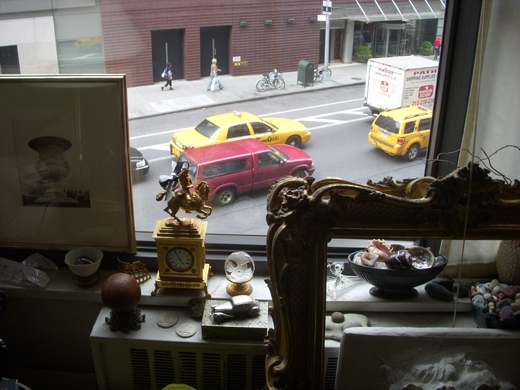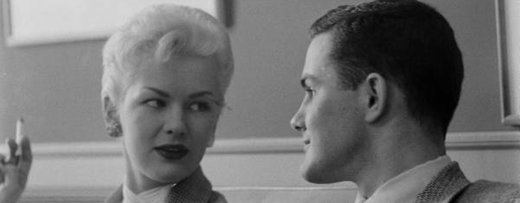
Early this afternoon, Kathleen turned on her computer, planning to slog through a somewhat tedious work-related project while surrounded by the comforts of home. Bad weather seemed to compensate for the the inconvenience of drafting with just one monitor.
She ended up going to the office after all. Although her laptop instantly connected with the apartment’s wireless network, her browsers and whatnot remained strangely out of touch. We still don’t know why, but the damage was very gooey. A system-restore was eventually effected, remotely, by the local divinity to whom we turn in times of such distress, and that seemed to clear up the problem. Did some long-dormant and undetectable virus spring to life over the weekend? Possibly.
For the most part, I sat by the laptop, trying to read the Times but finding my attention sorely distracted by the wizardry of a darting cursor and the illusion of spontaneously-opening panes. Occasionally, I had to transmit a password — from another computer, of course.
So I didn’t have the day that I’d planned, either. Here’s what I did not do:
- Read The Economist. Â
- Plant the geraniums and pansies that have been in flats for ten days now.
- Remove the three CD carousels from beneth the long sofa in the living room and replace them with bins full of letters and Christmas cards. If you just re-read the foregoing because you thought that you must have misread it, or I miswritten it, then you’ll have some idea of my enthusiasm for this project. It will, however, be a step forward.
- Bake madeleines.
When I sat down to compose tomorrow’s Daily Office, my head was just about as gooey as Kathleen’s Windows files. Trolling through the shoals of RSS feeds turned up a lot of same-old same-old news. I’d say that it is taking the mainstream media a long time to get with the Obama program: we’re in for a long, hard season of boring but elementary appraisals and fixes that won’t make for catchy copy. The president, it turns out, is no more interested in being newsworthy than his predecessor was; but, unlike Mr Bush, he does not do crazy things and then wonder why the dogs of the press are nipping at his heels.
The current administration is so boringly sane that Frank Rich was reduced, in his column today, to comparing last week’s “photo-shoot” fiasco (the one involving Air Force OneN) to FDR’s second-term exercises in hubris (attempting to pack the Supreme Court, for one). Mr Rich writes excitingly about the collapse of the Republican Party —
Not long before The Wall Street Journal informed its readers that 81 percent of Americans liked Obama, Karl Rove wrote in its pages that “no president in the past 40 years has done more to polarize America so much, so quickly.â€
— but the lack of passed gas emanating from the White Houses leaves him gasping.
Which is exactly why the mainstream media may never get used to the new regime. They can’t afford to. They’re fighting, as Mr Rich himself points out, for their lives. On Friday, Jason Kottke responded to a Morning News poll with the names of three publications that he reads in print. (The New Yorker, The New York Times on weekends, and, once in a while, Wired.)
If that’s the future, then I’m very much the past: the Times every day; The New Yorker, The Nation, L’Express International, and The Economist weekly, The Atlantic and Harper’s monthly, and now, the Columbia Journalism Review — I don’t know how often that comes out. Not to mention a list of literary magazines (books, really) running from Granta on down. And of course the three literary “tabloids”: The New York Review of Books, the London Review of Books, and the eccentrically-published Bookforum. (I also pay an extra twenty bucks a year for the digital edition of NYRB, largely so that I can quote it here, something that “I ought to do more often” — the motto of this entire litany.)
Periodicals that I no longer take: Foreign Affairs (grand, but semi-professional; information is one thing, and smoke-signals are another); TLS (all smoke-signals); and The New Republic (because I disagree apoplectically with its editorial staff’s position on Palestine). A magazine that I wouldn’t dream of having in the house: New York. I considered the alternative and stuck with it. The Observer evokes the most frightful memories of high school.
Oh! I forgot Vanity Fair and France-Amérique. Shame on me. Time was, I wouldn’t have Vanity Fair in the house, either. Now I consider it to be The New Yorker’s drolly wayward first cousin — Eloise to Harriet the Spy.
Of all these publications, it’s the Times that seems the most to be in trouble, not only financially but purposively. What, exactly, is it for? The Times appears to have nothing like the clarity about its readership that the Daily News (“left”) and the Post (reactionary) enjoy. Its friends carp almost as loudly as its foes. Right now, I’d say that the Times is engaged in a no-win joust. I don’t know what the Gray Lady is up against, exactly, but the horse that she’s riding is called Institutional Nostalgia. Â
Would I trade my daily Times, delivered to the door, for unassailable Internet access — meaning a guarantee against ever having to spend an afternoon tethered to a computer damaged by malware? You bet I would.


















